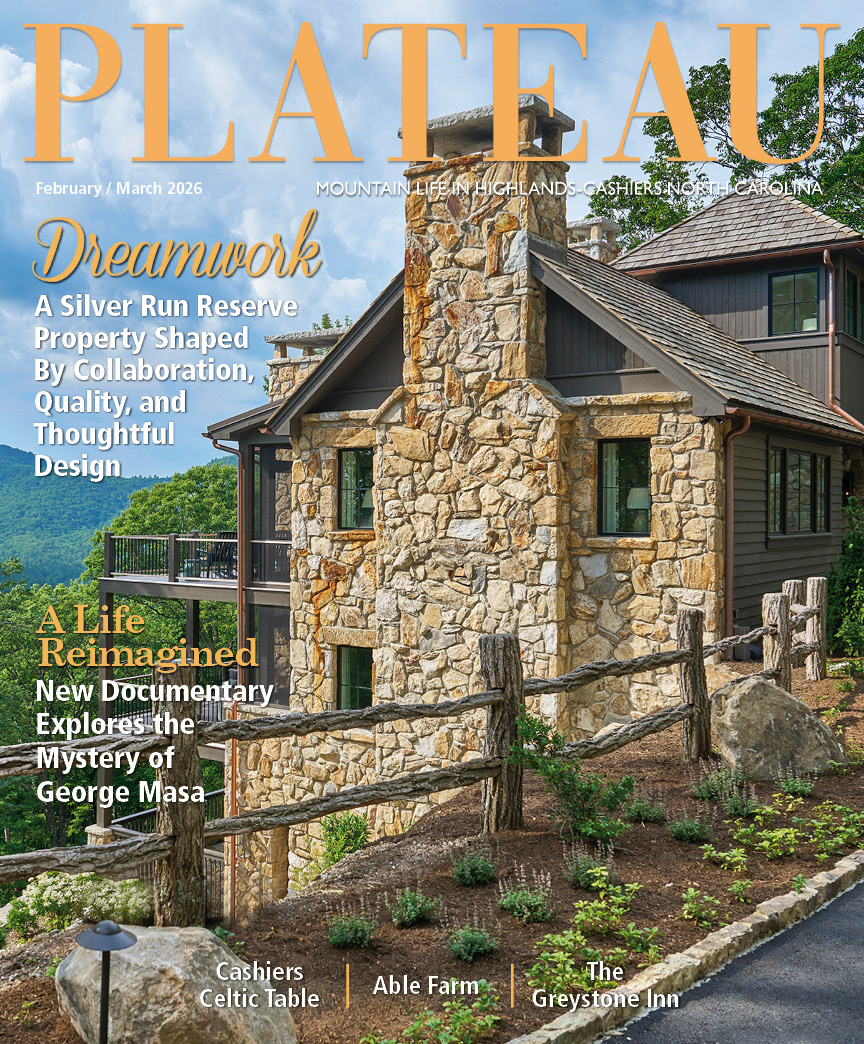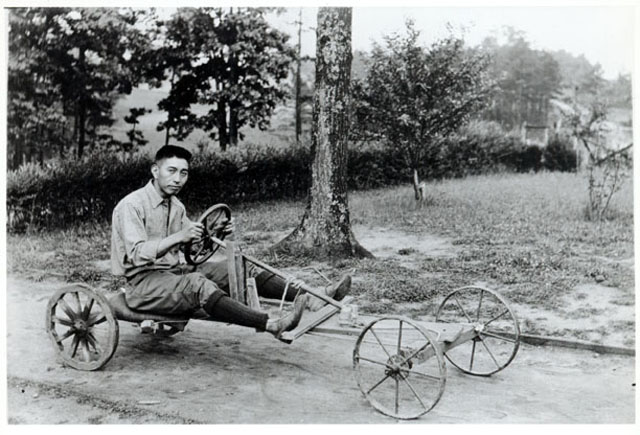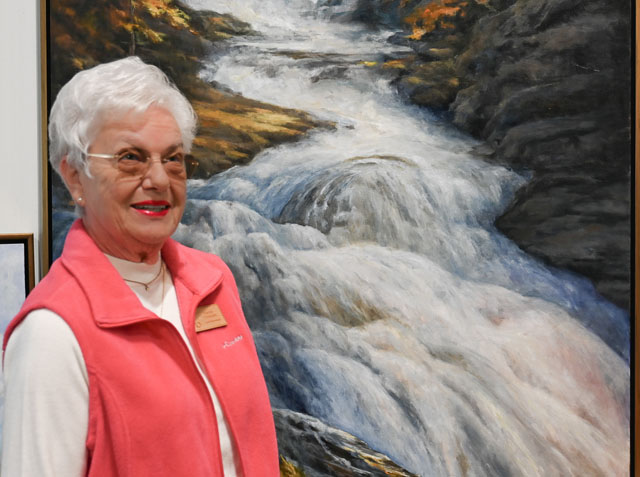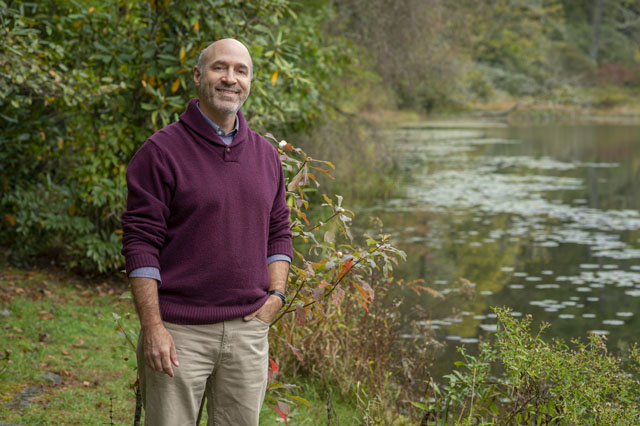Southern Literature
04 Dec 2024
Acclaimed writer Ron Rash is inducted into the North Carolina Literary Hall of Fame
By Clint Kimberling » Photos by EMMA POTTER

Ron Rash is known for capturing the realities of Appalachia through his novels and stories set in the foothills and mountains of the Carolinas. The author of eight novels, seven short story collections, and four books of poetry, Rash’s sustained output over a career spanning four decades is impressive and workman-like. His books have appeared on best seller lists, received numerous prizes and awards, and have been adapted for the screen. Despite the accolades and international readership, his work, characters, settings, and life have created an identity intertwined with the Appalachian region.
Rash, now 71, is lean with his hair swept back and down his neck. He still carries the runners build of his youth. He’s easy to talk to; kind and approachable like a patient teacher. This demeanor gleaned from his day job as a professor of literature and Appalachian studies at Western Carolina University. A post he’s held for 21 years that he calls a perfect fit.
In October of this year, Rash was inducted into the North Carolina Literary Hall of Fame. As a writer who has been inextricably linked with North Carolina and Appalachia in the same ways that William Faulkner is connected to Mississippi or Flannery O’Connor to Georgia, it is perhaps more surprising to find out that Rash was not already included in the state literary hall of fame.
Ed Southern is the Executive Director of North Carolina Writer’s Network, the organization that manages the literary hall of fame. He does not see Rash’s inclusion as an overdue honor, but perhaps a career capstone. “Ron is one of finest writers in North Carolina. In any medium, across novels, short stories, poems, he’s a true artist and the body of work he’s produced measures up with just about anyone,” he says.
Rash is grateful for the recognition, no matter the timing. “It means so much to me, to be included with so many of my favorite writers, starting with Thomas Wolfe, more recently, Lee Smith, Robert Morgan, and my close friend Jill McCorkle. Just so many of the writers that I've admired are part of it,” he said. “It's kind of like I finally got my letter jacket, right?” he jokes.
“It’s an important honor for me. North Carolina's had such a great literary tradition. It's great to be officially recognized and noted as a part of that,” Rash says.
As Rash enters the hall of fame, he feels the literary tradition he helped cultivate will continue to thrive. And as a literature professor he has a deep commitment to growing new generations of readers, writers, and thinkers. He’s quick to recognize other writers are in line to take up the mantle of this literary tradition in North Carolina.
“The literary tradition here is, I think, in good hands with some younger writers like Wiley Cash or David Joy,” he says. “Annette Clapsaddle is another. Mark Powell at Appalachian State is a really good writer. I think a lot of really, really good writing continues to come out of the region, and I think it will continue to. I don't have much doubt about that.”
David Joy, author of four books set in western Carolina, was a student of Rash’s at WCU. A talent Rash says that he could see right away. “What he's got is innate, you know, it's not something you teach someone. You hope that you can keep them headed, keep them going. I could also see that he had the kind of discipline that would benefit him.”
Rash knows from discipline. For years he has committed himself to a daily writing practice of three hours. The self-discipline and regimental work he says were honed and developed through daily workouts during his years as a distance runner in high school and college. “The sustained daily training was as good for me as a writer, because it set an expectation. Day after day, I would always put in the work.”
He blocks out distractions, turns off the phone. “Some days I get more done than others, but for me, it’s important to make it a natural part of my day. And I just don't feel right unless I put in those hours.”
In between classes and writing, he spends most of his free time reading. “As I get older, I tend to read more and more nonfiction. I love to read about wildlife and endangered species. I've always been interested in the natural world, and I've always been fascinated, particularly with creatures that are kind of on the edge.”
“I'm afraid my characters live much more interesting lives than I do,” he jokes. It sounds like a line, a canned Dad joke. But Rash assures me he’s not joking.
Rash’s characters are exceptionally interesting. He renders true-to-life depictions of Appalachia that read as a portrayal of everyday life in the region. They are saddled with family conflict, tragedies, mysterious pasts, as well as challenges and pressures encountered by working-class people.
“It's a conduit into the universal. You're ultimately exploring human concerns,” Rash says about his characters. As an author, he has a unique ability to connect readers with a familiar setting, dialect, and even place names while exploring commonality and broader themes. “I’m showing both the distinctiveness but also the universality,” he notes.
Rash’s latest novel, "The Caretaker", was published in 2023. It was widely praised and selected as one of the Best Books of the Year by the New York Times. Throughout his career, Rash has consistently released a novel every two to three years. However, "The Caretaker" came out nearly seven years after his previous book.
“I felt some extra internal pressure on this last one,” he explains. “I set it on my grandparents’ farm. It's a community between Blowing Rock and Boone and a place where I spent so much of my childhood. And that's the first time I've set a book in as important a place as that and I think I felt an additional pressure to really get that place right,” he says.
“I wanted to be as true to that place as I could, so anyone who knows my family will recognize that place instantly.”
Rash has hinted that "The Caretaker" may be his last novel. If that is the case, Rash is at peace with it. “This feels like the novel that I kind of want to end on. Writing about my childhood feels like a good bookend. Kind of like I want to start where I began.”
Rash takes a beat and then mentions the Irish poet Seamus Heaney. “Heaney wrote a poem late in his life and two lines have stuck with me,” he says.
The line from Heaney’s poem “A Herbal” reads:
I had my existence. I was there.
Me in place and the place in me.
Rash continues, saying, “I think about those lines in wanting to make a final stamp on this place, a final attempt at honoring it, and I think I’ve done it with this book.”













